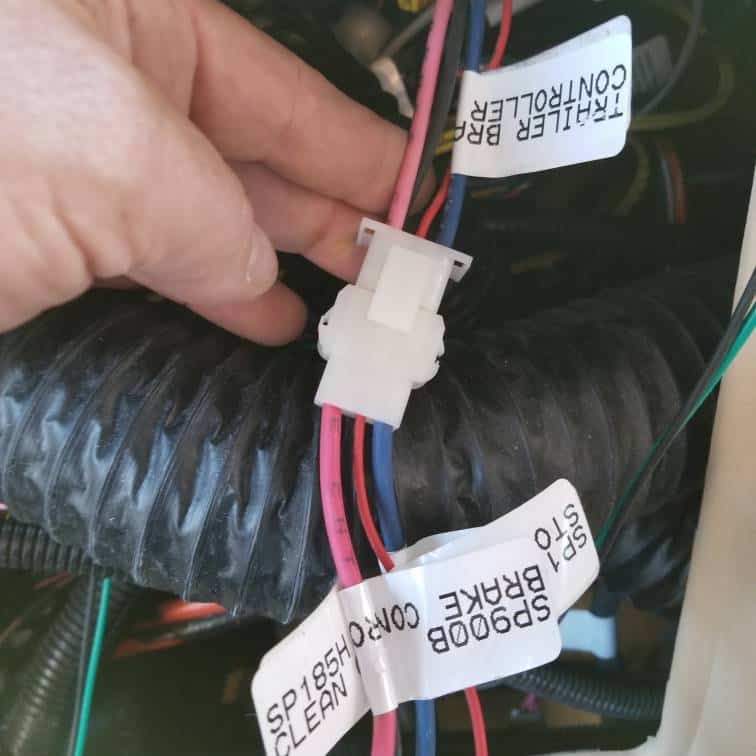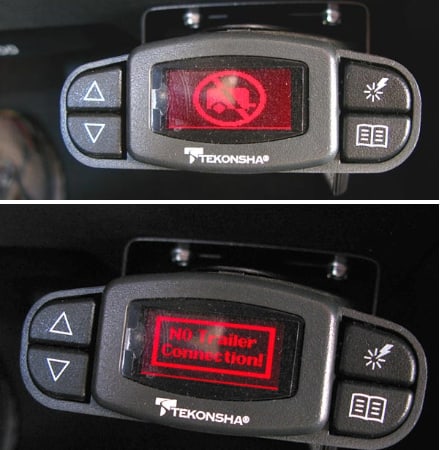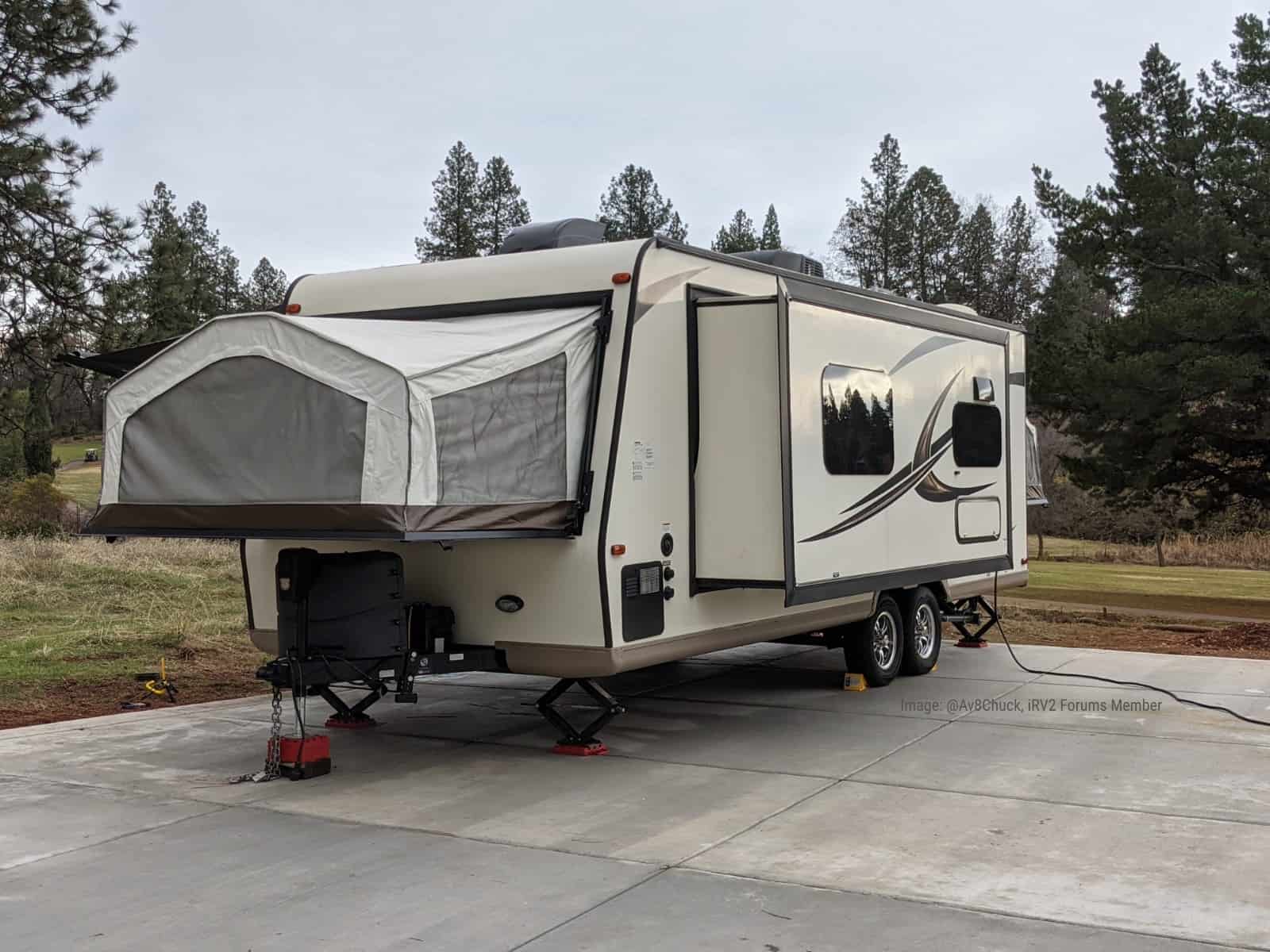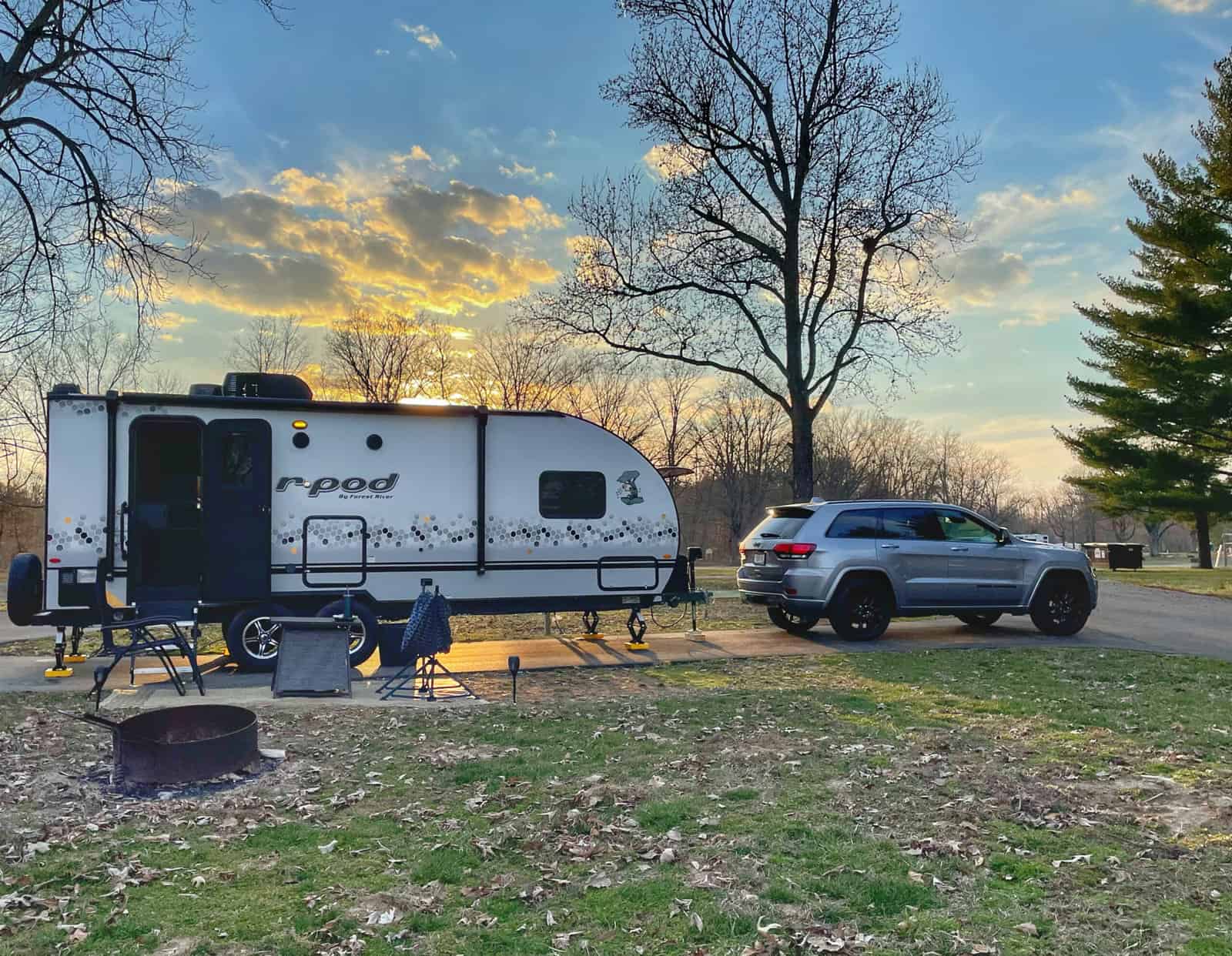Is your travel trailer a risk to other drivers? If you don’t know that camper trailer brake controllers are necessary for safe travels, it probably is. For most RV bumper-pulls, a camper trailer brake controller (TBC) device can be the difference between a safe trip or a white-knuckled drive that can’t end soon enough. Or worse!
Don’t be that guy who wrecks his trailer because he didn’t know that a trailer brake controller is necessary for safe and smooth stopping. Keep reading for a basic overview of how they work. Learn about the different types of trailer brake controllers. And most importantly, learn how to use your brake controller for safer RV travels.
Are Camper Trailer Brake Controllers Necessary?
With the exception of the smallest camper trailer models, such as lightweight pop-ups, most bumper-pull RVs have built-in electric brakes. When towing an RV equipped with trailer brakes, your trailer’s wiring harness will control those brakes by plugging into your tow vehicle’s 7-pin wiring harness outlet. That is. if you have a brake trailer brake controller installed correctly.
Applying your camper trailer brakes using the factory plug alone means the trailer brakes may be applied at the same time and pressure as your vehicle brakes. This works, however, you lack the ability to operate the trailer brakes independent of the tow vehicle’s brakes. Without a controller, you also probably can’t easily adjust the braking force.
How Do Camper Trailer Brake Controllers Work?
Typical camper trailer brake controllers (TBC) come in two forms; factory-installed units and aftermarket units. Many trucks and larger SUVs come factory equipped with brake controllers that work very well. For any vehicle without this factory option, aftermarket trailer brake controllers are readily available and pretty easy to install.
Factory units are installed conveniently in the dash and close to the steering wheel for quick, safe use. Under the dash close to the driver’s knee is the most common installation location for aftermarket units. This allows for easy adjustment and operation in emergency situations.
A trailer brake controller generally has two functions:
- Adjusting trailer brake pressure
- Applying the trailer brakes independently of the vehicle brakes.
Some controllers have the ability to do both, and some just do one. This works well for the most part. But there are other ways that a trailer brake controller gives you more control over your trailer brakes.

The towing marketplace is filled with plenty of TBC choices. But they all come down to just two types of trailer brake controllers:
- Proportional Trailer Brake Controllers (sometimes called an inertia-based brake controller)
- Time-delayed Trailer Brake Controllers (often referred to as a time-based brake controller).
Proportional Camper Trailer Brake Controllers Versus Time-Delayed Controllers
A proportional trailer brake controller is the superior way to slow down your trailer’s momentum.
- Proportional trailer brake controllers have an electrical circuit known as an accelerometer. The accelerometer monitors the tow vehicle’s braking speed and force. Then it applies the exact proportional braking power to the trailer’s momentum.
A time-delayed trailer brake controller sounds exactly like what it is:
- When you hit your tow vehicle’s brakes, there’s a pre-set time before the trailer’s brakes fully engage.
With a time-delayed brake controller, choosing a limit for braking is known as adjusting the gain. This determines the amount of power or braking force sent to the trailer’s brakes from the tow vehicle. You can adjust gain in your personal settings. Then, increase or decrease the intensity of the trailer’s momentum to match the towing conditions. This ensures a safe and smooth stop.
If your brake controller’s trailer gain sensitivity setting adjusts from 1-10, the latter being the maximum output of braking, 5 might be the best flat highway setting. If you are starting the downhill stretch of a mountain pass, quickly adjusting to 7 or 8 gain setting will provide stronger trailer braking. This rapid response can help keep the trailer straight and prevent it from pushing your tow vehicle when you apply the brakes.
How to Adjust Braking Pressure (a game changer!)
When you apply your vehicle brakes while towing, the connected wire harness sends a signal and applies the trailer brakes. The amount of braking from the vehicle compared to the trailer can vary. Adjusting the trailer brake force with manual activation can adjust the trailer brakes. However, this is not easily done nor does it allow for on-the-go adjustment for different situations.
You Can Enjoy Independent Trailer Braking
In the majority of towing situations, a combination of vehicle and RV braking is the best and safest way to stop your camper and tow vehicle. But sometimes you’ll want to apply trailer brakes and not the vehicle brakes. This is to prevent the trailer from overtaking the tow vehicle. Here are some examples of when applying only the vehicle brakes is most likely going to keep you safe.
- In some emergency stopping situations, like a deer crosses your path, trailer braking alone can stop the trailer’s momentum and prevent a catastrophe.
- Or if trailer sway occurs while driving down the road, you can slow down the trailer while keeping the tow vehicle pointed straight.
- And if you ever encounter a steep downhill driving situation that forces the trailer’s momentum to exceed the tow vehicle’s speed, independently applying trailer brakes can slow down the trailer.
In all three of the above situations, the tow vehicle is free to advance but brake pressure is holding the trailer back. The trailer will now no longer be trying to overtake the tow vehicle. The trailer is, in a sense, pulled back in place straight behind the tow vehicle. In addition, manually applying only the trailer brakes and slowly pulling forward is the best way to confirm you are hitched up properly before departing.
Most trailer brake controllers will have a lever to squeeze. Doing so applies the brakes while increasing the pressure as you squeeze the lever tighter. This is a better braking method, versus quickly applying full force to the trailer brakes.

The #1 Reason Camper Trailer Brake Controllers are Necessary and Helpful
Every tow vehicle and RV has different weights, braking force, and road manners. Dial in all these things together for smooth and effective braking. It can change your travel trailer towing experience greatly. Trailer brake controllers make towing more pleasurable and relaxing. And less risky on the open road.
All it takes is a minimum of cost and time investment. After that, the small cost of an aftermarket electric trailer brake controller can make a huge difference in the safety and comfort of your towing heavy loads like travel trailers. Having a brake controller, knowing how to properly use it, and understanding how to make adjustments on the move is a game changer!
Need any more reasons to get a camper trailer brake controller for RVs? I didn’t think so. The small cost of an aftermarket trailer brake controller can make a huge difference in the safety and comfort of your towing, and your safety. Having a brake controller and knowing how to properly use it and make adjustments is a game changer!
Pro Tip 1: Practice Camper Trailer Brake Controller Towing
After installing an electric trailer brake controller, you will want to practice using it before taking a long RV trip. Look for a large, level surface like an empty RV-friendly big box store parking lot to get some braking experience under your belt. Test applying the brakes with different gain settings and at different speeds until you feel both the vehicle and trailer braking together in sync.
Pro Tip 2: Your Travel Trailer Needs a Breakaway System Too!
Another important way to prevent travel trailer accidents is by installing a safety device called a breakaway system. This is a installed on travel trailers in order to automatically activate the trailer’s brakes if it becomes disconnected from the tow vehicle while you’re driving it. A runaway travel trailer can cause major damage, something you definitely want to avoid.



